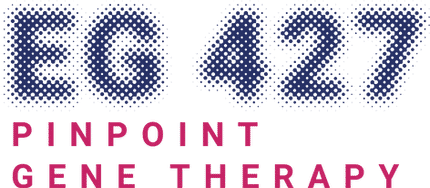PARIS, France I June 24, 2024
I EG 427, a biotechnology company leading the development of pinpoint DNA medicines for prevalent diseases in neurology based on its unique non-replicative HSV-1 vector platform, announces today that it has received Investigational New Drug (IND) clearance from the U.S. Food and Drug Administration (FDA) for EG110A, a gene therapy for the treatment of Neurogenic Detrusor Overactivity (NDO) in Spinal Cord Injury (SCI) patients. The phase 1b/2a study is being initiated in 2 leading US institutions.
EG110A is a non-replicating HSV-1 vector that has been designed to selectively silence the signals of key bladder sensory neurons responsible for the bladder muscle overactivity, whilst preserving motor neuron and retaining normal bladder function.
NDO is a common urinary bladder dysfunction caused mainly by SCI and other neurodegenerative diseases, such as Multiple Sclerosis or Parkinson’s disease. NDO causes uncontrolled urinary incontinence, risk of kidney damage as well as urinary tract infections than can lead to death in 5-10% of the SCI population. NDO affects most (70-84%) patients with SCI
1
, an estimated total of 300,000-400,000 worldwide. It has a significant impact on their quality of life. The European Association of Urology recently estimated that incontinence caused by NDO and other indications, such as overactive bladder, represents a growing economic burden of over €40 billion per year in Europe
2
.
“NDO is a serious bladder condition, for whom treatment options are limited,” said Cornelia Haag-Molkenteller, MD, PhD, Chief Medical Officer of EG 427. “Preclinical results have shown clear evidence that suggests EG110A could offer significant medical improvement over existing therapies. These data have shown that one course of treatment with EG110A can potentially lead to long-lasting efficacy without affecting the bladder function. We are excited to move this promising product into the clinic.”
“This IND clearance for our first product is a major milestone for EG 427, opening the way for clinical development of EG110A across a series of medically important but neglected neuro-urology pathologies. It is a step forward in bringing the potential benefits of gene therapy to large disease populations in neurology. Non-replicative HSV-1 vectors are truly unique in their ability to deliver therapeutic solutions in a potentially safe, redosable and cost-effective way,” said Philippe Chambon, MD, PhD, Chief Executive Officer at EG 427.
Neurological diseases affect some 3 billion people, or about 1 in 3 worldwide, and their medical needs are underserved, a study by
The Lancet Neurology
3
found. EG 427 is building a pipeline of products to address these diseases, based on its proprietary non-replicative HSV vector platform, uniquely suited to target neural cells in a safe and long-lasting manner.
About EG 427
EG 427
is the second company to bring a non-replicating HSV-1 (nrHSV-1) vector into clinical development, with an Investigational New Drug (IND) cleared by the US Food and Drug Administration (FDA) in June 2024. It will be the first human trial of such a vector, targeting sensory neuron-based diseases. The product, EG110A, addresses multiple severe bladder diseases, such as neurogenic bladder (NDO) and overactive bladder (OAB), and has the potential to be a major improvement over existing therapies, resulting in better care for patients and lower costs for healthcare systems.
The company’s unique platform delivers pinpoint neurotherapeutics to treat prevalent diseases of the peripheral and central nervous system. Its vectors can achieve focal transduction in specific regions and then selective expression of transgenes in targeted subsets of neurons thanks to the control of sophisticated regulatory elements. With demonstrated clinical safety and possible repeated dosing, the large payload capacity of nrHSV-1 vectors allows either for long-term gene therapy, or all-in-one gene editing approaches.
1
Hamid, R., Averbeck, M.A., Chiang, H. et al. Epidemiology and pathophysiology of neurogenic bladder after spinal cord injury. World J Urol 36, 1517–1527 (2018). https://doi-org.libproxy1.nus.edu.sg/10.1007/s00345-018-2301-z
2
https://uroweb.org/press-releases/incontinence-costs-european-society-over-40-billion-euros-per-year
3
Global, regional, and national burden of disorders affecting the nervous system, 1990–2021: a systematic analysis for the Global Burden of Disease Study 2021. https://www-thelancet-com.libproxy1.nus.edu.sg/journals/laneur/article/PIIS1474-4422(24)00038-3/fulltext#seccestitle210
SOURCE:
EG 427






